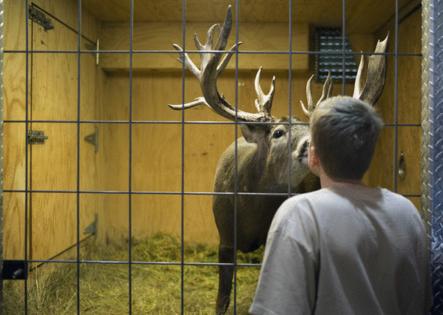Minnesota deer farmers lose for the second time in their attempt to nullify new regulations
Published in Outdoors
MINNEAPOLIS — Minnesota deer farmers have been denied a second time in their fight to stop a 2023 state law that will bring an end to their industry in Minnesota after another generation.
The Eighth Circuit Court of Appeals upheld a lower court’s dismissal of the group’s lawsuit, rejecting their argument that they have the right to pursue a chosen profession.
“There is no fundamental right to pursue the occupation of whitetail deer farming,” the Eighth Circuit justices ruled.
The change in law adopted by the 2023 Legislature introduced new regulations aimed at ridding deer farms as vectors of chronic wasting disease (CWD) — a growing problem in Minnesota’s wild deer herd. The law prohibits the formation of any new deer farms and limits existing herd owners to one transfer of their business, and only to an immediate family member.
Another change in the law gave the Department of Natural Resources authority to require deer farmers to upgrade fencing to prevent physical contact between captive deer and wild deer.
A year ago, U.S. District Court Judge John Tunheim ruled the eventual elimination of deer farms in Minnesota was an “unfortunate” consequence of the law. The judge said the state has a legitimate interest in containing the infectious spread of CWD, an always-fatal neurological disease that DNR has been spending millions of dollars to keep in check. DNR wildlife biologists have connected past outbreaks in wild deer to infected deer farms.
The Minnesota Deer Farmers Association, along with individual deer farmers, filed suit against the state, seeking an injunction to prevent enforcement of the new regulations. They have argued it’s a violation of the 14th Amendment that they’re not being allowed to pursue an occupation of their choice.
Scott Fier, president of the deer farmers association, wrote to members last year to say there was hope of a favorable outcome. If denied in District Court, the focus would shift to appealing in the Eighth Circuit, “where our case will be heard by primarily conservative judges.”
But as reported by Courthouse News Service, U.S. Circuit Judge David Stras, a Donald Trump appointee and a former Minnesota Supreme Court justice, told the deer farmers’ attorney at a court hearing in May the right to choose an occupation is subject to reasonable regulation of that work.
Steve Porter of Kittson County, one of the deer farmers involved in the lawsuit, posted on Facebook last week that the lawsuit has implications for farmers of all types. He invited financial contributions to help bring the case to the U.S. Supreme Court.
Erick Kaardal, attorney for the deer farmers, said he’ll petition the high court to take the case within 90 days. The Supreme Court can deny the request. He said his clients will be seeking support from a variety of agricultural groups, including livestock associations.
“We feel like the case has become more important,” Kaardal said. “Why aren’t there protections for people pursuing farming?”
He said there’s an issue of economic liberty at the heart of the case. “You can’t buy land and be a farmer? Really?,” he said. “I think a lot of people would be surprised the government can regulate farming in these ways.”
The number of deer farms in the state has drastically declined since DNR wildlife biologists linked them to outbreaks of CWD. In 2020, Minnesota had 175 registered herds of whitetail deer. Today, the number of deer farms stands at 79.
DNR issued a statement saying it takes the protection of wild deer seriously and the new law is critical to the fight against the spread of CWD. The Eighth Circuit’s ruling affirms the state’s authority to regulate deer farms, the agency said.
____
©2025 The Minnesota Star Tribune. Visit startribune.com. Distributed by Tribune Content Agency, LLC







Comments